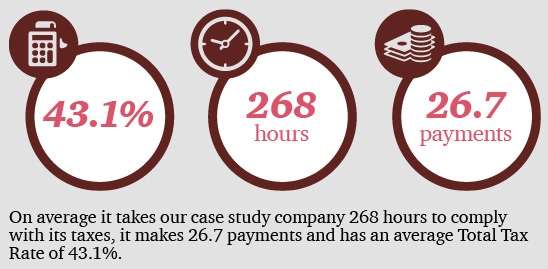Tax-Wise, U.S. Just Isn't That Competitive for Business


With tax season upon us, if you were a foreign business owner regarding all of this scurrying around to file forms and pay the United States government its take, would you consider the activity as relatively attractive compared to the alternatives? Or would you consider it a turnoff?
To judge by rankings released last year by the consulting firm PricewaterhouseCoopers (you can call it PwC), businesses may venture into the Land of the Free for market opportunities, but that may well be despite a pretty uncompetitive tax regime. The U.S. ranks 64 out of 189 for ease of paying taxes, has a total tax rate that's above average and, importantly, barely seems to be trying to compete with other countries that Americans once mocked as overtaxed and overgoverned.
According to PwC, "Paying Taxes 2014 looks not only at corporate income tax, but at all of the taxes and mandatory contributions that a domestic medium-size case study company must pay. It considers the full impact of all these taxes in terms of both their tax cost and their compliance burden on business."
In considering the tax hassles faced by its hypothetical company, the report states the average total rate as 43.1 percent, the average hours spent on compliance each year as 268, and the average number of annual payments as 26.7. By comparison, the U.S. imposes a total tax rate of 46.3 percent, and requires 175 hours and 11 payments to comply.

Well, that's how the U.S. stacks up compared to the average. But the average includes garden spots like Zimbabwe and Uzbekistan. How do we compare to the in-crowd?
Err… Well the good news is that the U.S. seems to be improving in many areas, such as compliance time. The bad news is that we're a bit of an also-ran, even in our own neighborhood. Canada, for instance, ranks at 8, has a total tax rate of 24.3 percent, and requires 131 hours and eight payments to comply each year.
Canada has now been in the top ten of the rankings for the last three studies. There are two major factors producing Canada's high ranking for this type of business. First is the significantly reduced corporate income tax rate on the first CAD500,000 of annual Canadian profits made by a privately owned corporation. Second is Canada's sustained effort to simplify electronic reporting, filing and payment, and the tax regulatory and compliance aspects of running a business ('tax red-tape').
Well… Our tax system is more attractive than Mexico's. So we have that going for us.
The United Kingdom is ranked at 14, with a total tax rate of 34 percent, and 110 hours and eight payments required every year.
Australia ranks at 44, with a total tax rate of 47 percent, and 105 hours and 11 payments required every year.
Sweden, the one-time welfare state poster child, but recent convert to free market-ish policies, ranks at 41, with a total tax rate of 52 percent, and 122 hours and 4 payments required every year.
Even France ranks higher than America, offsetting higher taxes (yes, higher than Sweden) with less burdensome compliance requirements.
The U.S. still does better, overall, than China, or Germany (which kill themselves on compliance time), and a business making a go of it in Russia probably worries as much about the local goons as tax environment, but you'd like to think the U.S. could do better.
But then, if you're filing your income taxes, you probably knew the U.S. should be doing better.
Check out the report here and compare your favorite shaded areas on the map here.
Editor's Note: As of February 29, 2024, commenting privileges on reason.com posts are limited to Reason Plus subscribers. Past commenters are grandfathered in for a temporary period. Subscribe here to preserve your ability to comment. Your Reason Plus subscription also gives you an ad-free version of reason.com, along with full access to the digital edition and archives of Reason magazine. We request that comments be civil and on-topic. We do not moderate or assume any responsibility for comments, which are owned by the readers who post them. Comments do not represent the views of reason.com or Reason Foundation. We reserve the right to delete any comment and ban commenters for any reason at any time. Comments may only be edited within 5 minutes of posting. Report abuses.
Please to post comments


...barely seems to be trying to compete with other countries that Americans once mocked as overtaxed and overgoverned.
One simple cannot reform one's tax system and buy votes through class warfare at the same time. Now, on to our oppressive regulatory environment...
So we know how the tax burdens in different countries will effect Hypothetical, Inc. But what do the numbers say about actual businesses picking up and moving between countries?
I for one am shocked whenever anyone chooses to do business here.
This is why immigrants only come from countries worse than us. We're now so bad we only get the lowest of the low.
"mandatory contributions"
Someone at PwC doesn't understand what an oxymoron is.
American exceptionalism, bitches!
American exceptionalism is bad then doesn't mean the higher taxes is good? I mean what did you think the critics of American exceptionalism meant by it?
That America can do the very same bad things that it says other countries can't do, because they are not bad when America does it.
What? I think he was sarcastically mocking the commonly-held notion (often dubbed "American exceptionalism" by many, although of course a term like that is always subjective to some extent) that America is the freest of the free in all aspects.
We can have a prosperous and growing economy with the taxation. We can have one with the regulation. It isn't possible to do it with both.
Get rid of both of them ideally. Get rid of one of them if that's the best we can do. But don't add any more straws to the camel's back.
The amount of taxes and regulation matters, since no government anywhere imposes zero taxes or zero regulation.
True, but what I meant was the golden goose is on life support at this point. I'd argue that if you stripped out deficit spending and makework boondoggles, we're very close to zero growth at this point.
The bastards in DC are very close to sending us into an economic death spiral, and they just keep making things worse.
I think that the regulation and lack of transparency (including the tax code complexity) is the biggest problem. Tax rates matter, but not as much as those things IMHO.
Yeah, I think taking a straight X% of your earnings and sending them to DC every year is nowhere near the same level of issue as not knowing day to day or week to week if some bureaucrat is going to shut you down for violating one of the thousands of pages of regulations that have the force of law.
"There is a lot of ruin in a country"
We're not at Zimbabwe levels of bad. I think the contention that we're worse than France is ludicrous.
And, if you throw in the effect of federalism, some states are pretty good to do business in, others are staggering on due to their comparative advantages despite their government's attempt to ruin them.
There was content there. Reason's squirrels are at it again.
I'll try again:
"Federalism" write large in the US just means you have more regulatory bodies and more taxing districts that anywhere else on the planet.
You have big city government, trumped by county government, trumped by state government, trumped by federal government. And that ignores the thousands of special taxing districts that lie between these easy-to-identify levels.
But then, if you're filing your income taxes, you probably knew the U.S. should be doing better.
You're probably right J.D., Reason readers are probably not filing their income taxes.
Probably filing them, but treating them as a work of creative fiction writing.
but treating them as a work of creative fiction writing.
We're talking about taxes here, not a police report.
Warty Hugeman and the Doomtax of Doom
This makes a verty good sense I think dude.
http://www.GotzAnon.tk
Go Saudi Arabia, 8th in the World.
Sort of OT, but...
Personally, as a small business owner, the biggest thing that the US could do that would make taxes easier for us is to get rid of the obnoxious quarterly estimated tax payments. If there's one easy way to screw small business owners coming and going, it's to force them to set money aside in case they make money, then penalize them if they make too much.
Of course, I'm one of those reprobates who thinks I should only have to write one check at the end of the year for my Federal taxes due and, oh yeah, get rid of paycheck withholding, but we all know that will never happen because people might start to pay attention to how much they pay in taxes.